
Rabindra Bharati University is a public research university in Kolkata, India. It was founded on May 8, 1962, under the Rabindra Bharati Act of the Government of West Bengal in 1961, to mark the birth centenary of the poet Rabindranath Tagore. It is located at the Tagore family home, Jorasanko Thakur Bari. The university offers undergraduate and postgraduate programmes in Performing Arts and Visual Arts under the Faculty of Fine Arts, Humanities, Social Sciences and other subjects under the Faculty of Arts.

Shantiniketan is a neighbourhood of Bolpur town in the Bolpur subdivision of Birbhum district in West Bengal, India, approximately 152 km north of Kolkata. It was established by Maharshi Devendranath Tagore, and later expanded by his son, Rabindranath Tagore whose vision became what is now a university town with the creation of Visva-Bharati. It is also the birthplace of Amartya Sen, an Economist, Philosopher, & Nobel Laureate

Jorasanko Thakur Bari is a Haveli in Jorasanko, North Kolkata, West Bengal, India, is the ancestral home of the Tagore family. It is the birthplace of poet Rabindranath Tagore and the host of the Rabindra Bharati University campus.

Rabindra Sangeet, also known as Tagore Songs, are songs from the Indian subcontinent written and composed by the Bengali polymath Rabindranath Tagore, winner of the 1913 Nobel Prize in Literature, the first Indian and also the first non-European to receive such recognition. Tagore was a prolific composer with approximately 2,232 songs to his credit. The songs have distinctive characteristics in the music of Bengal, popular in India and Bangladesh.

Pankaj Kumar Mullick was an Indian music composer, playback singer and actor, who was a pioneer of film music in Bengali cinema and Hindi cinema at the advent of playback singing, as well as an early exponent of Rabindra Sangeet.
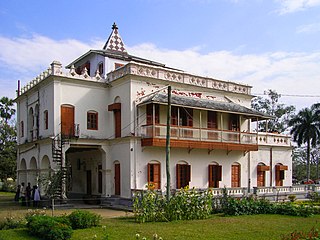
Shilaidaha is a village in Shilaidaha Union, Kumarkhali Upazila of Kushtia District in Bangladesh. The place is famous for Shilaidaha Kuthibari; a country house made by Dwarkanath Tagore. Nobel laureate Rabindranath Tagore lived a part of his life here and created some of his memorable poems while living here.

Rabindranath Tagore was a Bengali poet, writer, playwright, composer, philosopher, social reformer, and painter of the Bengal Renaissance. He reshaped Bengali literature and music as well as Indian art with Contextual Modernism in the late 19th and early 20th centuries. Author of the "profoundly sensitive, fresh and beautiful" poetry of Gitanjali, in 1913 Tagore became the first non-European and the first lyricist to win the Nobel Prize in Literature. Tagore's poetic songs were viewed as spiritual and mercurial; where his elegant prose and magical poetry were widely popular in the Indian subcontinent. He was a fellow of the Royal Asiatic Society. Referred to as "the Bard of Bengal", Tagore was known by the sobriquets Gurudeb, Kobiguru, and Biswokobi.

Suchitra Mitra was an Indian singer, composer, artist exponent of Rabindra Sangeet or the songs of Bengal's poet laureate Rabindranath Tagore, professor, and the first woman Sheriff of Kolkata. As an academic, she remained a professor and the Head of Rabindra Sangeet Department at the Rabindra Bharati University until 1984. Mitra was a playback singer in Bengali films and was associated for many years with the Indian People's Theatre Association.
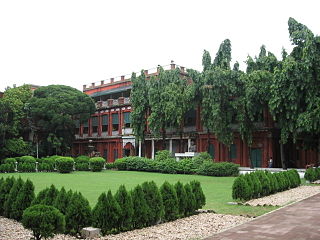
The Tagore family has been one of the leading families of Kolkata, India, and is regarded as one of the key influencers during the Bengali Renaissance. The family has produced several people who have contributed substantially in the fields of business, social and religious reformation, literature, art, politics and music. The most prominent figures of this family include Dwarkanath Tagore, a pioneering industrialist; Rabindranath Tagore, Nobel laureate in literature; Abanindranath Tagore, a distinguished artist and more.
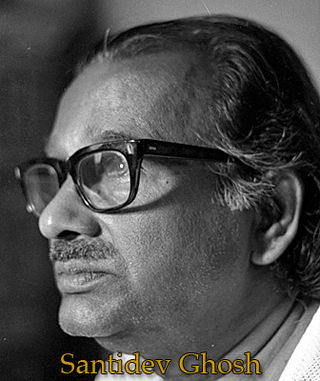
Santidev Ghose was an Indian author, singer, actor, dancer and maestro of Rabindra Sangeet.

Maitreyi Devi was an Indian poet and novelist. She is best known for her Sahitya Akademi Award-winning novel, Na Hanyate.

Dinendranath Tagore, also known as Dinu Thakur, was a Bengali musician, singer and poet.
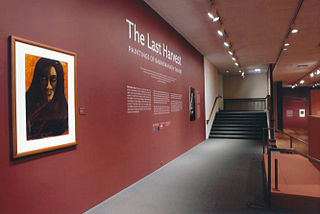
The Last Harvest was an exhibition of Rabindranath Tagore's paintings to mark the 150th anniversary of Tagore's birth. It was commissioned by the Ministry of Culture, India and organised with the National Gallery of Modern Art (NGMA). It consisted of 208 paintings drawn from the collections of Visva Bharati and the NGMA. The exhibition was curated by art historian R. Siva Kumar. Asia Art Archive later classified the exhibition as a "world event".
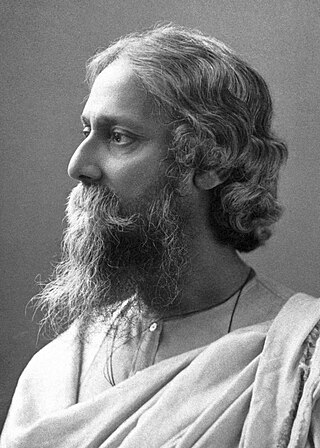
Rabindra Jayanti is an annually celebrated cultural festival, prevalent among Tagorephiles around the world, in remembrance of Rabindranath Tagore's birthday anniversary. It is celebrated in early May, on the 25th day of the Bengali month of Boishakh, since Tagore was born on this day of the year 1268 of the Bengali calendar. Every year, numerous cultural programmes and events, such as: Kabipranam (কবিপ্রণাম) – the songs, poetries, dances and dramas, written and composed by Tagore, are organised in this particular day, by various schools, colleges and universities in Bengal, and is also celebrated by different groups abroad, as a tribute to Tagore and his works. Throughout the globe, Tagore's birth anniversary is largely celebrated at Santiniketan, Birbhum in West Bengal, chiefly in Visva-Bharati University, the institution founded by Tagore himself for the cultural, social and educational upliftment of the students as well as the society. In 2011, the Government of India issued a five-rupee coin to mark the 150th anniversary of Rabindranath Tagore's birth.

Pratima Devi (1893–1969) was an Indian Bengali artist, widely known for her artistic abilities. She was the wife of Rathindranath Tagore. The poet took special interest in developing her capabilities.

Rabindra Complex is located in Dakkhindihi village, Fultala Union Parishad, Phultala Upazila, 19 km from Khulna city, Bangladesh. It was the residence of Rabindranath Tagore's father-in-law, Beni Madhab Roy Chowdhury. In British India, Fultala Union Parishad was a single village named Fultala village and was under Jessore district of then Khulna Mohakuma. Tagore family had close connection with Dakkhindihi village. The maternal ancestral home of the poet was also situated at Dakkhindihi village, poets mother Sarada Sundari Devi and his paternal aunt by marriage Tripura Sundari Devi; was born in this village. Not only that his grandmother Digambari Devi also was from Dakkhindihi. Young Tagore used to visit Dakkhindihi village with his mother to visit his maternal uncles in her mothers ancestral home. Tagore visited this place several times in his life. It has been declared as a protected archaeological site by Department of Archaeology of Bangladesh and converted into a museum.

Sangit Bhavana, of Visva-Bharati University, Santiniketan, started functioning as a part of Kala Bhavana in 1919 and as a separate institution in 1933. It was established by the Nobel laureate Rabindranath Tagore.
Mangpoo is a village in the Kurseong Vidhan Sabha Rongli Development Block in the Darjeeling Sadar Subdivision of the Darjeeling district in the state of West Bengal, India.



















